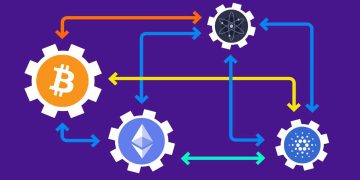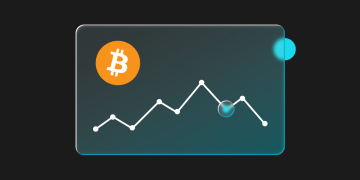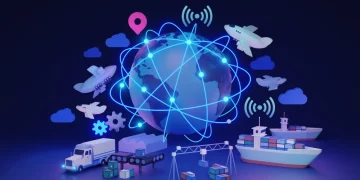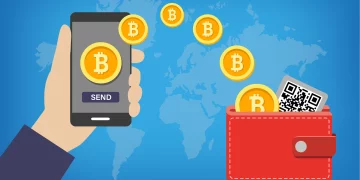Introduction
In today’s globalized economy, cross-border payments represent a critical component of international trade, finance, and business operations. However, the traditional cross-border payment infrastructure, often relying on multiple intermediaries and a complex network of financial institutions, is riddled with inefficiencies. High transaction costs, slow settlement times, and the risk of errors or fraud are some of the major challenges faced by businesses and consumers alike.
Enter Enterprise Chain—a decentralized blockchain solution that is transforming the way cross-border payments are conducted. By leveraging decentralization and smart contract automation, Enterprise Chain significantly reduces the time and costs associated with cross-border transactions, offering businesses a more efficient, secure, and transparent alternative to traditional financial systems.
This article will explore how Enterprise Chain works, focusing on the concepts of decentralization and smart contract automation, and how they contribute to reducing costs and time in cross-border payments. We will also examine real-world applications, technical innovations, and the future potential of Enterprise Chain in reshaping the global payment landscape.
1. The Challenges of Traditional Cross-Border Payments
Cross-border payments are essential for businesses engaged in international trade, investment, and finance. However, traditional systems for processing these payments face several significant challenges:
- Multiple Intermediaries:
Cross-border payments often involve several intermediaries, including correspondent banks, payment processors, and clearing houses. Each intermediary adds an additional layer of cost, time, and complexity to the transaction. Furthermore, each party involved must follow their own set of rules and compliance requirements, which can slow down the process and increase the likelihood of errors or delays. - High Fees:
The involvement of multiple intermediaries leads to high transaction fees, which can often range from 2% to 5% of the total amount being transferred. For businesses and individuals making frequent international transfers, these fees can add up quickly, reducing the overall efficiency and profitability of cross-border transactions. - Slow Processing Times:
Traditional cross-border payment systems can take anywhere from 1-5 business days to process a transaction. This delay is primarily due to the need for manual reconciliation, time zone differences, and the complex validation processes carried out by intermediaries. For time-sensitive transactions, this delay can be a major bottleneck. - Security Risks and Fraud:
The involvement of multiple intermediaries in cross-border payments introduces several vulnerabilities. Fraud, money laundering, and data breaches are common risks in these systems. As each intermediary has access to different parts of the transaction, the chances of a security breach are amplified, leaving businesses and consumers exposed.
These challenges highlight the need for a more efficient, secure, and cost-effective way to handle cross-border payments. This is where Enterprise Chain comes in.
2. The Rise of Enterprise Chain: A Decentralized Solution
Enterprise Chain is a blockchain-based solution that seeks to address the issues of inefficiency, high costs, and delays in cross-border payments. By using decentralized ledger technology (DLT) and smart contracts, Enterprise Chain offers a transparent, secure, and automated approach to handling international transactions.
- Decentralization:
At the core of Enterprise Chain is decentralization, which eliminates the need for intermediaries. Traditional payment systems rely on central entities like banks or payment processors to validate and settle transactions. In contrast, Enterprise Chain operates on a distributed network of nodes that work together to validate and record transactions in a secure, transparent manner. Each transaction is verified by multiple independent participants in the network, reducing the risk of fraud and errors while speeding up the process. - Blockchain Transparency:
Transactions on Enterprise Chain are recorded on a public or permissioned blockchain, depending on the use case. This ensures transparency, as every participant in the network can access the transaction history in real time. Blockchain technology also ensures the integrity of the data, as it is nearly impossible to alter or tamper with the records once they are committed to the chain. This offers enhanced security and reduces the risk of fraudulent activity. - Smart Contracts:
One of the key innovations that Enterprise Chain brings to cross-border payments is the use of smart contracts. Smart contracts are self-executing agreements that automatically enforce the terms and conditions of a contract when predefined conditions are met. These contracts are stored and executed on the blockchain, ensuring that once the conditions are met, the contract is executed without the need for manual intervention. This is especially useful in cross-border payments, where conditions such as exchange rates, payment amounts, and recipient verification can be programmed into the contract.

3. How Enterprise Chain Reduces Costs in Cross-Border Payments
- Eliminating Intermediaries:
By removing intermediaries from the transaction process, Enterprise Chain significantly reduces the cost of cross-border payments. Traditional systems often involve multiple banks, payment processors, and clearinghouses, each of which takes a fee for their services. With Enterprise Chain, transactions are validated and settled directly between parties on the blockchain, removing the need for multiple intermediaries and lowering transaction costs.- Example: A typical cross-border payment involving a correspondent bank may incur fees ranging from 2% to 5% of the total transaction. By using Enterprise Chain, these costs are minimized, and businesses can save substantial amounts on each transaction.
- Automated Settlements via Smart Contracts:
Traditional cross-border payments require manual intervention for verification and settlement, leading to delays and additional costs. Enterprise Chain’s smart contract automation eliminates the need for manual reconciliation and intervention. Once the predefined conditions are met, the transaction is automatically settled, ensuring that both parties receive the agreed-upon amount without delays or errors.- Example: In the case of a cross-border payment from a company in the United States to a supplier in India, a smart contract can be set up to automatically trigger the payment when goods are shipped, taking into account the exchange rate and delivery time. This reduces the need for intermediaries such as banks, currency exchange services, and third-party payment processors, resulting in significant savings.
- Reduced Currency Exchange Fees:
Currency exchange is a major contributor to the high costs of cross-border payments. Traditional payment systems typically involve currency conversion at each intermediary step, leading to multiple exchange rate markups. Enterprise Chain can streamline this process by enabling direct, peer-to-peer currency exchanges via decentralized finance (DeFi) protocols. This allows businesses to access more competitive exchange rates and avoid unnecessary fees.- Example: By utilizing decentralized exchanges (DEXs) built on Enterprise Chain, businesses can exchange currencies directly between two parties, often with a much lower fee than through traditional forex services.
4. How Enterprise Chain Reduces Transaction Time
- Real-Time Settlement:
Traditional cross-border payment systems typically take one to five business days to settle a transaction due to the involvement of intermediaries and time zone differences. Enterprise Chain, on the other hand, enables real-time settlement by automating the process and removing the need for intermediary validation. As soon as the conditions of the smart contract are met, the transaction is confirmed and settled on the blockchain, reducing the settlement time from days to minutes or even seconds.- Example: A company that needs to pay a supplier in a different country can use Enterprise Chain to settle the payment instantly, eliminating the traditional wait times associated with wire transfers or international checks.
- 24/7 Availability:
Unlike traditional financial systems, which are often subject to banking hours and holidays, Enterprise Chain operates 24/7. This means that businesses can initiate and settle cross-border payments at any time, regardless of time zone differences. This is especially useful for global companies that need to make payments across multiple regions, as it reduces the time spent waiting for business hours to align. - Reduced Reconciliation Time:
Enterprise Chain’s use of blockchain and smart contracts ensures that all transactions are recorded in real time on the ledger, eliminating the need for manual reconciliation. Traditional payment systems often require multiple rounds of verification and auditing, which can take several days. With Enterprise Chain, the transaction history is available instantly and transparently, ensuring that both parties can verify the transaction immediately.
5. Real-World Use Cases of Enterprise Chain in Cross-Border Payments
Several companies and institutions are already leveraging Enterprise Chain for cross-border payments. Below are some examples:
- Ripple (XRP) and Cross-Border Payments:
Ripple’s XRP Ledger is a well-known example of a blockchain platform used to facilitate real-time cross-border payments. By using Ripple’s technology, banks and financial institutions can offer fast, low-cost cross-border transactions. XRP’s consensus algorithm ensures that payments are settled quickly and securely, without the need for intermediaries. - IBM Blockchain and Stellar for Payments:
IBM and Stellar have partnered to provide blockchain-based cross-border payment solutions for banks and businesses. By using blockchain technology, IBM’s World Wire platform allows financial institutions to transfer funds instantly and with lower costs. Stellar’s native cryptocurrency, XLM, is used to facilitate these transactions, ensuring that currency conversion and payment settlement occur on the blockchain. - Blockchain-Based Remittance Services:
Companies like SendFriend and TransferWise (now Wise) have integrated blockchain into their cross-border remittance services to offer faster and cheaper options for international money transfers. By using blockchain, these platforms can eliminate high fees and slow settlement times traditionally associated with international remittance services.
Conclusion
The use of Enterprise Chain in cross-border payments is revolutionizing the way international transactions are processed. By eliminating intermediaries, leveraging smart contract automation, and offering real-time settlement, **Enterprise
Chain** significantly reduces both the cost and time involved in cross-border payments. Furthermore, its decentralized and transparent nature enhances security, reduces the risk of fraud, and provides a more efficient alternative to traditional payment systems.
As more businesses and financial institutions adopt Enterprise Chain, the future of cross-border payments looks promising. By continuing to innovate and refine blockchain-based solutions, Enterprise Chain is poised to play a key role in shaping the future of global finance, driving down costs, and improving the efficiency of cross-border transactions worldwide.

















































